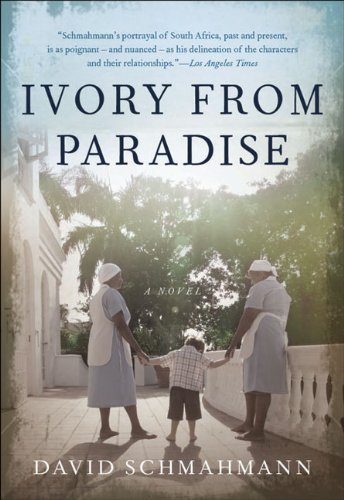
 As the story begins, Helga, matriarch of a prominent white family from Durban and a firebrand anti-apartheid activist, lies dying in the London mansion of her second husband, industrialist Arnold Miro. Her children, Danny and Bridget, now married and living in Boston, have come to be with her in her last days. A simple domestic drama? One where grieving adult children bid farewell to their beloved mother?
As the story begins, Helga, matriarch of a prominent white family from Durban and a firebrand anti-apartheid activist, lies dying in the London mansion of her second husband, industrialist Arnold Miro. Her children, Danny and Bridget, now married and living in Boston, have come to be with her in her last days. A simple domestic drama? One where grieving adult children bid farewell to their beloved mother?
That is merely the jumping-off point for Schmahmann's (Empire Settings) beautifully realized exposition of family, myth, the stories we tell ourselves about our lives and of apartheid itself.
Helga married Arnold just a year after her husband Silas's death, and left South Africa forever for the lush life in London. Arnold is a controlling, sadistic bully. Danny, as narrator, says: "I realized on my first visit to Arnold's house... when I heard Arnold refer to my father's collection as 'curios,' as if they had been picked up at some roadside stand, that he was among those who found the entire notion of owning and displaying anything African absurd." That is, until it became popular to own African folk art and Arnold discovered that these "curios" could be valuable.
Silas's collection, especially a pair of ivory elephant tusks believed to have once belonged to Shaka Zulu himself, now prominently displayed in Arnold's home, become symbols in the story for all that we remember about our lives, and all that memory rewrites, often those parts we don't care to look at.
The family--Bridget, her husband and daughter; Danny and his wife--are openly at odds with Arnold, who insists that Helga wants him to have everything that was hers. While Arnold is visiting his mistress, the family removes Helga from her deathbed to a sorry little flat, along with everything they believe to be theirs.
Some time after Helga's death, the family goes back to Durban at Bridget's insistence, to hold a memorial. It is a disaster, poorly attended, awkward, and features Arnold arriving, unannounced, to take center stage. Also present is Baptie, the African maid/nanny who cared for Danny and Bridget when they were children. They now take care of her, granting her a lavish pension. She acts as the Greek chorus, sorting out all that is true from what Helga's family would like to hold onto as true. She is the realist in the story. The night before the memorial, Baptie's son, Eben, and Danny meet for a drink; Schmahmann, in their conversation, writes beautifully of white guilt, African rage, money, Baptie's remembrance of apartheid days as her golden days, how difficult everything is now in the semi-chaos of African rule.
Danny has learned something about his father's collection; Eben has learned that the Zulu warrior after whom his son, now imprisoned for murder, has renamed himself, never existed. These are just two of the illusions and contradictions woven in and out of this story, making it poignant and unforgettable. In the end, Danny says of the tusks, "Their provenance, like ours, is incomparable."--Valerie Ryan
Shelf Talker: A South African family returns to Durban to memorialize their mother and discovers the fragility of what they have always believed about themselves.

